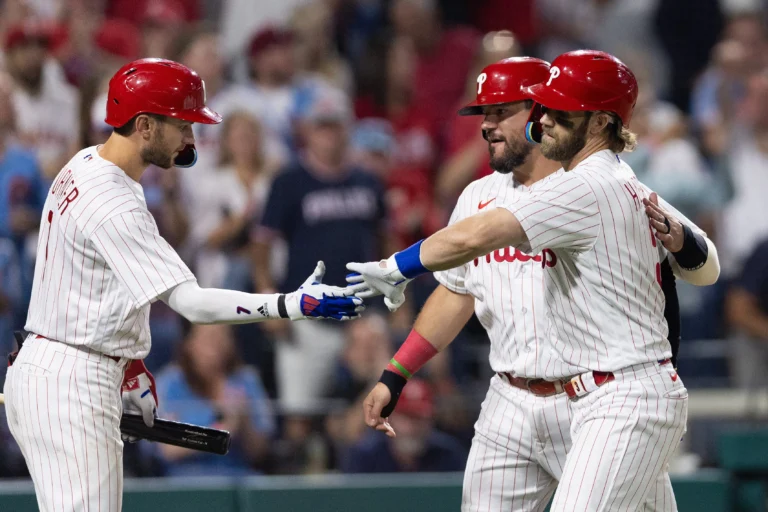Trea Turner has been a prominent figure in Major League Baseball, particularly known for his speed and offensive capabilities. However, his performance can be viewed through various lenses, especially when it comes to advanced statistics. Let’s dive into the analysis and context surrounding his role with the Philadelphia Phillies, as well as the implications of his performance compared to other key players like Kyle Schwarber and Bryce Harper.
### Contextualizing Trea Turner’s Performance
1. **Historical Performance**: Trea Turner has had impressive seasons prior to joining the Phillies, often ranking among the top shortstops in the league. His combination of batting average, on-base percentage, and stolen bases has made him a dynamic player.
2. **2023 Season Overview**: In 2023, Turner’s performance may not have matched the expectations set by his previous seasons. Analysts often use various metrics—such as OPS (On-base Plus Slugging), WAR (Wins Above Replacement), and defensive metrics—to evaluate player effectiveness.
3. **Defensive Metrics**: Some analysts suggest that Turner’s defensive metrics have not been stellar. Fielding percentage, range factor, and defensive runs saved (DRS) can paint a more critical picture of a player’s value in the field. If Turner’s stats in these areas were below average, it could contribute to the perception of him being “one of the worst shortstops statistically.”
### Comparing the Big Three: Turner, Schwarber, and Harper
1. **Kyle Schwarber**: Known for his power-hitting, Schwarber has consistently provided home runs and runs batted in (RBIs) for the Phillies. His ability to get on base and hit for power contrasts with Turner’s more speed-oriented style.
2. **Bryce Harper**: Harper, a former MVP, brings a well-rounded game to the table. His hitting prowess, on-base skills, and leadership on the field often overshadow other players. His consistent production makes him a cornerstone for the team.
3. **Turner’s Role in the Lineup**: Turner’s position in the batting order typically means he’s expected to set the table for the power hitters behind him. If he struggles to get on base or generate runs, it can impact the overall performance of the lineup, putting pressure on Schwarber and Harper to carry the offensive load.
### Statistical Breakdown
1. **Offensive Contributions**: Analyzing Turner’s batting statistics from the 2023 season can highlight areas of concern. If his batting average is significantly lower than league average, or if his strikeout rate is high, this can diminish his perceived value.
2. **Base Running**: Turner’s speed is one of his biggest assets. If his stolen base attempts are down, or if he’s been caught stealing more often, it can raise questions about his effectiveness as a base runner.
3. **Defensive Contributions**: If Turner’s defensive stats indicate he’s costing the team runs, that can greatly influence how analysts view his overall contribution. Defensive struggles can lead to losses, which amplifies criticism.
### Reactions from Analysts
Analysts often provide a mixed bag of evaluations based on performance data, team context, and player expectations. For Turner, being labeled as one of the worst statistically could stem from a few bad metrics without considering the entirety of his skill set.
1. **Subjectivity of Statistics**: The interpretation of statistics can vary widely. A player can excel in one area while underperforming in another, leading to polarized opinions.
2. **Team Dynamics**: The performance of the Phillies as a whole can also reflect back on individual players. If the team struggles, key players like Turner, Schwarber, and Harper may receive disproportionate criticism.
### Looking Forward
1. **Adjustments and Expectations**: Moving forward, Turner may need to make adjustments to reclaim his status among the league’s elite shortstops. This could involve refining his batting approach, improving defensive positioning, or enhancing base-running techniques.
2. **Impact on the Team**: The Phillies’ success will heavily rely on the collective performance of their star players. If Turner can bounce back, it would not only benefit him personally but also strengthen the team’s chances in future competitions.
3. **Future Projections**: As the offseason approaches, the front office may consider how best to utilize Turner’s talents. Whether through trades, adjustments in the lineup, or coaching, there’s potential for a rebound.
### Conclusion
Trea Turner’s journey with the Philadelphia Phillies is a testament to the complexities of player evaluation in modern baseball. While analysts may point to troubling statistics, it’s important to consider the broader context—his previous success, the roles of other players like Kyle Schwarber and Bryce Harper, and the dynamics of team performance. Baseball is a game of ups and downs, and Turner’s story is still being written. With the right adjustments, he could very well reclaim his status as one of the top shortstops in the game.


